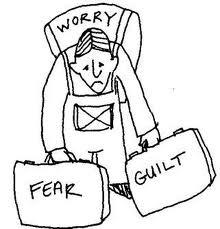Guilt is an uncomfortable emotion that results from our thoughts telling us that we have been responsible for causing harm or misfortune to somebody or something. It is a negative emotion that causes anxiety and sadness and often results in anger directed at the self along with internal confusion. People suffering from a condition called ‘chronic guilt’ find that they experience negative feelings of guilt due to their ten dency to misinterpret what happens to them and not to question the logic of their conclusions. In CBT, treatment often involves teaching people to rid themselves of the ‘negative automatic thoughts’ they have which tell them that they’ve caused others to suffer. People constantly plagued by guilt are also taught to recognise their ‘dysfunctional attitudes’ so that they recognise when they’re going through such mental processes as catastrophising (making the very worst of a bad situation) or over-generalising (believing that if one bad thing happened, many more must have as well). As CBT enables a person to change their emotions by changing their thoughts, this kind of treatment is very powerful in eradicating chronic guilt and self-blame: Once somebody can realise that they inaccurately see himself as causing others to suffer, he can readjust his mental set and more realistically figure out his role in whatever grief came their way.
dency to misinterpret what happens to them and not to question the logic of their conclusions. In CBT, treatment often involves teaching people to rid themselves of the ‘negative automatic thoughts’ they have which tell them that they’ve caused others to suffer. People constantly plagued by guilt are also taught to recognise their ‘dysfunctional attitudes’ so that they recognise when they’re going through such mental processes as catastrophising (making the very worst of a bad situation) or over-generalising (believing that if one bad thing happened, many more must have as well). As CBT enables a person to change their emotions by changing their thoughts, this kind of treatment is very powerful in eradicating chronic guilt and self-blame: Once somebody can realise that they inaccurately see himself as causing others to suffer, he can readjust his mental set and more realistically figure out his role in whatever grief came their way.
According to Susan Krauss Whitbourne, 2012, the causes of guilt can be broken down into five basic types.
(See: http://www.psychologytoday.com /blog/fulfillment-any-age/201208/the-definitive-guide-guilt?page=1.)
Guilt for something you did: Maybe you hurt somebody by your actions. Or maybe you violated your personal principles by lying or stealing, or by breaking a promise to you or somebody else (such as smoking or drinking or cheating on your new, healthy diet). In this type of scenario, it is appropriate to feel guilty. It is however, much more healthy to convert those feelings of guilt to ones of remorse. Guilt is negative state: it is stagnant and can result in over-thinking about the situation, which, in turn, can lead to negative automatic thoughts. In short, guilt does not serve a positive purpose as it does not manifest anything positive. On the other hand, remorse encourages positive action. Feelings of remorse encourage you to accept that you have behaved badly, apologise to whomever it may be that you have wronged and then look at ways of avoiding behaving the same way in the future. If you’ve violated your own personal standards (eg: through over-use of alcohol or cheating on your partner), you can best avoid straying in the future by seeking support from others who can help you rid yourself of this habit or help you to keep going when new patterns of behaviour become difficult to stick to> It is also worth bearing in mind that we are all egocentric. This means that we spend a lot of our time being caught up with how we are thinking, feeling and behaving. It may well be that we are feeling incredibly guilty about something that, to somebody else, is of little importance. That comment you made that you later realised may have sounded very insulting may not even have been noticed by the other person!
Guilt for something you didn’t do, but want to: No matter how hard you try, you r thoughts are filled with doing something that you know you shouldn’t. Having a sneaky cigarette, lying to your partner, in fact anything that you would normally consider to be dishonest, unfaithful, or illegal. This is a tough type of guilt to handle. It’s true that you haven’t actually done anything wrong and so technically you are ‘innocent’ however we all know that the very fact that you’re contemplating an act that violates your own standards can be as guilt-provoking as the act itself.
r thoughts are filled with doing something that you know you shouldn’t. Having a sneaky cigarette, lying to your partner, in fact anything that you would normally consider to be dishonest, unfaithful, or illegal. This is a tough type of guilt to handle. It’s true that you haven’t actually done anything wrong and so technically you are ‘innocent’ however we all know that the very fact that you’re contemplating an act that violates your own standards can be as guilt-provoking as the act itself.
If you are struggling with these kinds of thoughts, you could choose to repress (plug up) or deny (push away) those thoughts and feelings or you could try an approach called ‘Acceptance and Commitment Therapy’ (ACT). ACT allows you to recognise that you have these illicit thoughts, accept them as part of who you are right now, and then, commit yourself to changing your behaviour so that you don’t follow through on them. Instead of trying to shove those illicit thoughts and feelings under the carpet, you can consciously embrace your illicit thoughts and desires and work on reducing them to something that your conscience finds acceptable.
To be continued …


 g? Your bosses? Your clients? Your childrens? Husbands? Parents? … or Yours? Who is the only person who can ever really know exactly what it is that ensures your happiness, peace of mind, contentment? And who is the only person who should really be expected to put in the time and commitment to ensure that happiness, peace of mind and contentment?
g? Your bosses? Your clients? Your childrens? Husbands? Parents? … or Yours? Who is the only person who can ever really know exactly what it is that ensures your happiness, peace of mind, contentment? And who is the only person who should really be expected to put in the time and commitment to ensure that happiness, peace of mind and contentment?